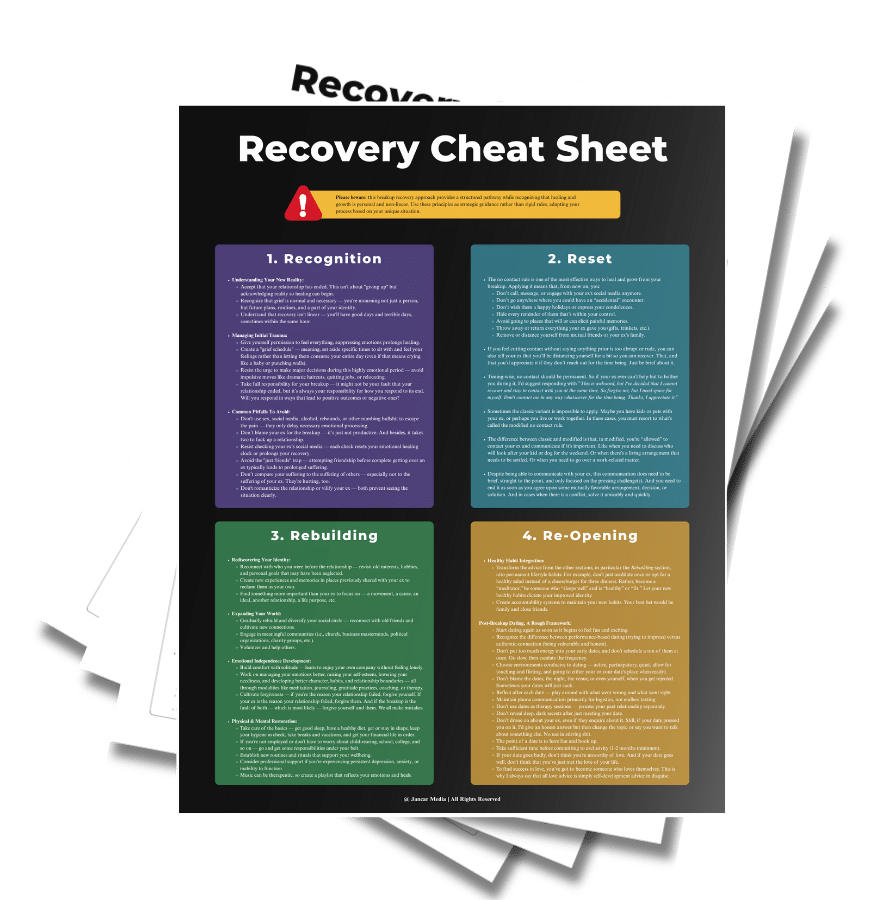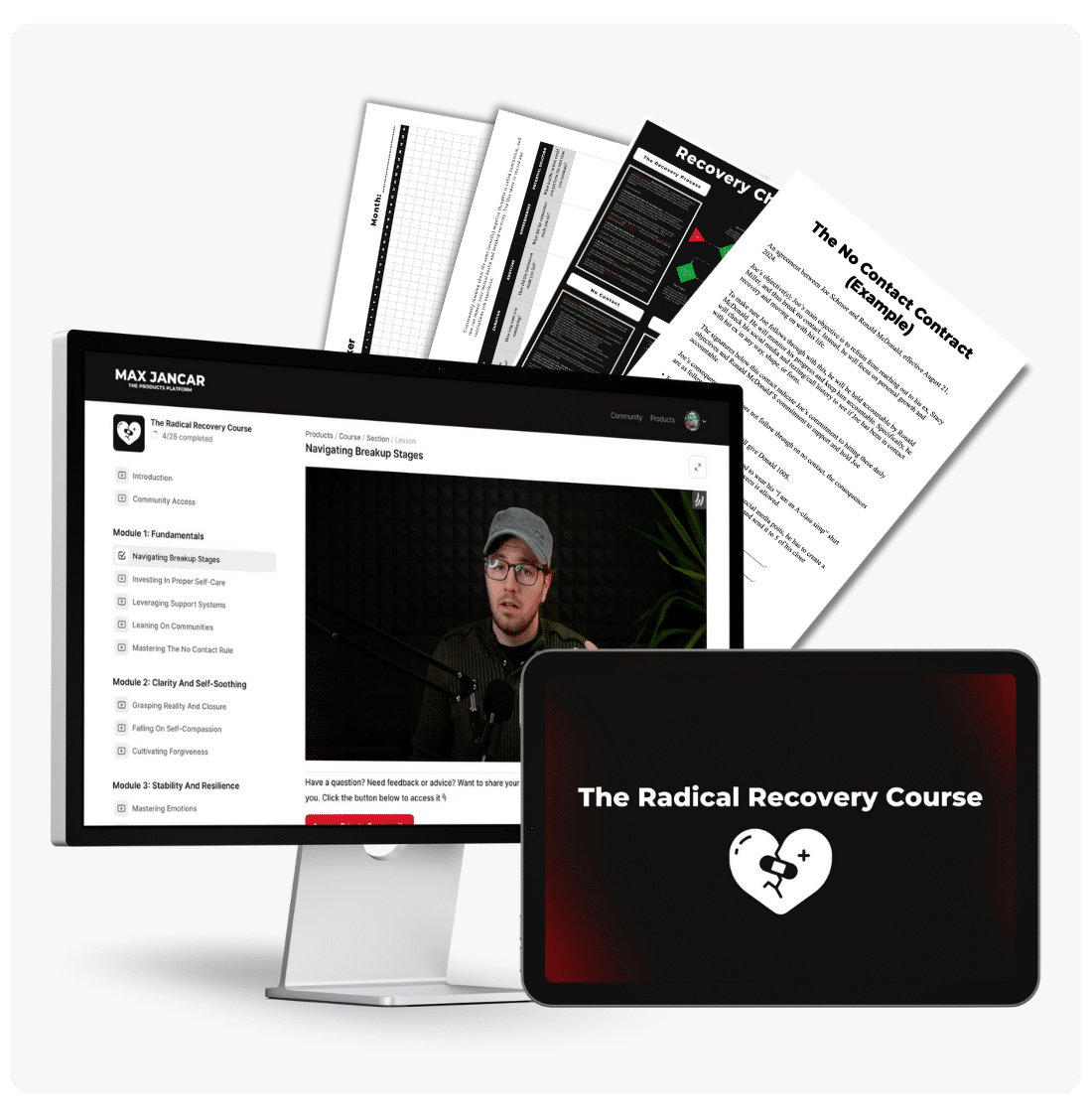Click play to listen to this article.
Self-esteem refers to the subjective evaluation of one’s worth and value. It involves how we perceive ourselves and our capabilities, as well as the degree to which we feel worthy, competent, and deserving of happiness and success.
If you think you’re a pretty good person, have confidence, and can accomplish your goals, you probably have high self-esteem. But if you think you’re an unworthy sack of shit, your life a raging dumpster fire, and that nobody loves you, you probably have low self-esteem.
And while self-esteem doesn’t explain everything about how we feel about ourselves, nor is it the most helpful tool for generating happiness, it is still important.
Why? Because high self-esteem leads us away from faulty and limiting beliefs like how we’re a terrible partner for getting into a breakup, how we’ll never find someone better than our ex, or how we’re unworthy of love.
It’s unfortunate, however, how many people have skewed beliefs around self-esteem. Many think those with high self-esteem are blessed with everlasting happiness, likability, a spicy love life, and financial success. While those with low self-esteem are cursed with emotional problems, lovelessness, drug addiction, and poverty.
It’s alarming how many people view self-esteem in this black-and-white bullshit way. But the truth is that there are many grey areas between the two extremes. So when you’re enhancing your self-esteem, your #1 goal should always be to stay in these grey areas.
Because as soon as you get close to either the white or black areas — the extremes of a metaphorical self-esteem spectrum per se — you’ll likely turn into one of two types of narcissists.
You’ll either become somebody who believes they’re perfect and deserve everything great and none of the pain. Or you’ll turn into someone who believes they’re flawed beyond repair, undeserving of happiness, and destined to fail at life and love.
Both of these types of narcissists see themself as special and unique and feel as though the whole world revolves around them and only them. That’s why we classify them as narcissists in the first place.
Don’t let this become you. Don’t get devoured by feelings of superiority and entitlement nor feelings of worthlessness and misery. Both options suck.
Given this dilemma, below are a few therapy-validated solutions to create healthy, sustainable self-esteem that keeps you firmly fixed to those ideal grey areas we discussed. Let’s begin.
A guide to breakup recovery based on embracing discomfort, extracting wisdom from dark moments, and healing through evidence-based practices.
Order Your Copy1. Practice Self-Compassion
People with low self-esteem tend to be pretty hard on themselves. They criticize and talk down to themselves, label themselves as failures, and just take their breakup way too personally. Therefore, some self-compassion would do them much good.
So the next time you’re being hard on yourself, consider being a bit softer. Approach yourself from the viewpoint of a kind and compassionate friend.
For example, instead of thinking or telling yourself, “My ex left me; I’m such a horrible partner,” think/tell yourself, “Maybe I did make my ex leave me, but that doesn’t make me a horrible partner. It just makes me a person who made mistakes. And that’s fine; we all make them.”
Or when you get so desperate about getting back with your ex that you text them something inappropriate — instead of thinking or saying to yourself, “I’m so stupid; why did I do that?” think/say, “Okay, so I fucked up. But I’ll do better next time. And if there is no next time, fine. I’ll get over them. My ex was not so special anyway.”
2. Write A Compassionate Letter
Let’s expand on the self-compassion theme I introduced in my last point.
Grab a piece of paper, close your eyes, and pretend you are your own best friend — someone kind, compassionate, nurturing — and then write a letter to yourself. Write down how you think your friend would respond to whatever you’re going through.
Suppose you’re pissed off, and you’re beating yourself up about the breakup. What would a kind and compassionate friend say to you in that case? Write it down.
Suppose you’re failing at getting your ex back and feel like you’re a worthless sack of shit. What would a kind friend tell you in that case? Write it down.
Suppose you have a hard time sleeping or working because you can’t get your ex out of your mind. What would a good friend tell you in that case? Write it down.
When you’re done writing your letter, read it out loud. There’s a good chance that what you wrote your imaginary friend said is far kinder and gentler than what you kept saying to yourself. If so, include their phrases and ideas in your self-talk and watch as your self-esteem eventually rises.
An online interactive video course that teaches you how to get past a breakup so you can create a new possibility for love (with your ex or someone new).
Get Instant Access3. Just Do Something
A perfect solution for those who lack self-esteem in a particular area. Since for most breakup survivors, that’s their love life, let’s make that our example. Let’s pretend you have high anxiety around sparking conversations with strangers you find attractive and consider yourself unworthy of a good date or a healthy relationship.
A decent starting point to get some self-esteem in this area would be to initiate interaction with the people you’re attracted to and hopefully get some positive responses so you can prove to yourself that there is, in fact, a possibility for you to find love.
That said, you don’t need to go big with this. You don’t need to, say, go straight to collecting phone numbers. Especially if you don’t feel comfortable doing so! Rather, forget about getting dates and forming relationships for now. Just focus on the tiniest actions that will give you a boost in self-esteem. Like greeting attractive strangers who walk past you while you’re, for instance, on a stroll.
And only when you get comfortable with the greetings, take on new, slightly bigger challenges. For instance, engaging an attractive stranger in small talk. And when even that feels second nature, then consider asking a stranger for their phone number or setting a date with them.
This may sound farfetched, but you have no idea how much momentum and motivation a tiny act like greeting a person you fancy gives you when rebuilding self-esteem around your love life.
So don’t stagnate. Just do something, and the rest will follow.
4. Cultivate Radical Acceptance
Sometimes you will feel inadequate. Sometimes you will feel unworthy of something or completely worthless. Sometimes you will see people happier than you, people in better relationships, people with better jobs and with more valuable skills — people with self-esteem much higher than yours.
All of this is okay. Accept it.
There will always be someone who is in some aspects better than you are and whose life is in some aspects better than yours. Get comfortable with this. Start accepting yourself for who you are, warts and all.
And look, I know you don’t believe me, but you’re okay. Sure, you can do and be better, but ultimately, you’re okay. We’re all flawed. We’re all average at most things. We all have our skeletons in the closet, our dirty laundry. It’s fine.
As counterintuitive as it sounds, it’s this way of thinking that will make you a happier, more self-esteemed person. Besides, it’s the acceptance of our flaws, problems, and situation that unlocks the door to genuine self-improvement.
5. Focus On What You Can Control
Most of the scary things we worry about post-breakup, we have no control over.
- Will your ex get pissed off if you tell them to stop texting you? Who knows! You can’t control how your ex perceives your plea for space.
- Will your ex give your relationship another shot? No idea. You can’t control how they feel about reconciliation.
- Will mutual friends leave you now that you broke up with your ex? We don’t know. You can’t control how your mutual friends react to your breakup.
The kicker here is that when you worry, it makes you feel as though you’re doing something productive. This is because we often equate worry with problem-solving. And that feeling of doing something productive is what temporarily alleviates helplessness and uncertainty.
It’s this alleviation process that makes worry such an addicting emotion. And, as you’d expect, when you’re addicted to worry, you’re constantly anxious and stressed — both of which inhibit your baseline level of self-esteem.
The solution? As the heading above says, focus on what you can control. Basically, understand what’s within your power to change and what isn’t, then shift your attention away from things beyond your power and towards aspects of a situation you actually have influence over. It’s that simple.
6. Know That A Breakup Isn’t A Failure
Lots of people take their breakup to heart, equating it with a personal failure that they won’t ever bounce back from. This is bullshit. It’s locking yourself into a fucking fictional mental prison.
Snap out of it!
You are not a failure because you got into a breakup. And if you keep thinking you are, you’ll only sabotage your self-esteem and, by extension, your future romantic relationships.
- You’ll settle for relationships that aren’t what we want.
- You’ll stay in relationships for longer than you should.
- You’ll tolerate partners even when they treat you like shit.
- You’ll put partners on a pedestal and butcher your identity and character for the sake of pleasing them.
- You’ll be prone to overlooking signs of incompatibility and red flags when dating.
How you avoid these toxic habits is simply by not letting your past define you or identifying with it. Learn and grow from it instead, then carry on.
This cheat sheet lays out 40+ solutions to overcoming a breakup so you can create a new opportunity for love — be that with your ex or someone completely different.
Get The Free Cheat Sheet


